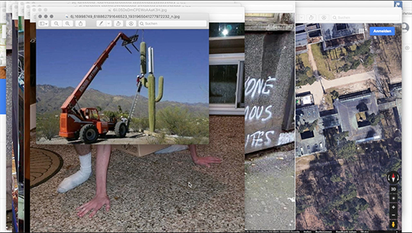Architecture, Urban Design, Graphic Design, Cartography, Writing, Teaching, Interventions
Work [chronological]
2023


The Kiosk of Solidarity is an urban practice format that intervenes in the contested social fields of work, health, and housing in Berlin. Since June 2023, over 25 solidarity-based Berlin initiatives and projects have used the kiosk for a few days at different locations in Berlin. In various formats, they bring together neighbors, fellow campaigners, and other interested parties and temporarily bring their solidarity practice into the public urban space. The kiosk creates visibility for marginalized groups (e.g. migrants, refugees, queer communities, or homeless people) and connects them with other initiatives. The kiosk project team, together with students from TU Berlin, supports the initiatives in realizing their ideas for using the kiosk: designing the posters, applying for stand permits, logistics, documentation, and financing.
The kiosk aims to create new solidarity-based places for encounters, networking, knowledge production and transfer, protest, appropriation, support, public relations, and participation in public space to strengthen the approaches to socio-ecological transformation supported by the initiatives.
The kiosk was initiated in 2023 as a spin-off of the Transforming Solidarities research project and has been active as an autonomous project since 2024, as part of the Constructlab e.V.
network.
The work of the kiosk was honored with the Spiegel Social Design Award 2023 (jury prize) and the Design Vision Award 2023 of the Saxon State Prize for Design.
More info here: www.kioskofsolidarity.net/ or https://www.instagram.com/kiosk.of.solidarity/
|
|
2022
2021
Team: Gareth Davies (Translation), Max Pfeffer (Exhibition Design), Ludwig Thanhäuser (Maps), Anna-Lena Wenzel (Copyediting). Logo: Marie Schuster - Bureau Est
Our project is realized in cooperation with Museum für Naturkunde, Berlin.
2020
Transforming Solidarities. Praktiken und Infrastrukturen in der Migrationsgesellschaft
09/2020 Förderzusage der Berlin University Alliance im Rahmen des Main Call Exploration Projects Social Cohesion:
»Transforming Solidarities. Praktiken und Infrastrukturen in der Migrationsgesellschaft« ist eine akademische, interdisziplinäre Forscher*innengruppe, die Berlin als »Labor« der
Migrationsgesellschaft fasst. Sie untersucht in den Feldern von Arbeit, Wohnen und Gesundheit die Bedingungen der Ermöglichung von Solidarität sowie die Praktiken und Infrastrukturen, in denen
sie ausgehandelt wird.
Arbeit, Wohnen, Gesundheit verstehen wir als zentrale Bereiche der vielfach diagnostizierten Krise gesellschaftlicher Reproduktion, in denen wir gesellschaftlich vereinbaren, wie wir solidarisch
sind. Angesichts der unabweisbaren Herausforderung, unter Bedingungen von Migration/Mobilität und Digitalität sowie sich lokal unterschiedlich artikulierender globaler Einflüsse, die Frage des
sozialen Zusammenhalts neu zu beantworten, eröffnet »Transforming Solidarities« neue Wege der gemeinsamen Wissensgenerierung.
Die Arbeitsgruppe besteht aus 16 Angehörigen der Berliner Universitäten (TU/FU/HU/Charité), die zum Thema Social Cohesion im Rahmen der Berlin University Alliance – Grand Challenge Initiative
arbeiten.
Hybrid Futures – Zwischen Kunst und Wissenschaft
28. Mai 2020, 20:15 Uhr, live und mit Publikumsinteraktion via Social Media unter:
www.futurium.de und www.hybrid-plattform.org
In deutscher Sprache. Moderation: Yvonne Zindel

I am part of the Spring School Moravia 2020, 24.02.-01.03, organized by Urban Lab Medellin Berlin. We will analyse, design and debate jointly with the community, students and professors of
architecture at University Santo Tomas Medellín and of environmental engineering at Tecnológico de Antioquia and together with colleagues of Technical University Berlin (Natural Building Lab), a
proposal to recuperate and reactivate the part of Moravia where two heavy fires happened in 2007 and 2017. The idea is to develop programmatic and spatial concepts and first designs for an public
spaces that combines urban agriculture, a staircase and sports facilities with a new and bigger Taller Tropical.
Funded by German Academic Exchange Service DAAD.
Text for Simon Weckert ›Google Maps Hacks‹-Performance & Installation
Simon Weckert used parts of my »The Power of Virtual Maps«-essay on his website to describe his performance. ›Google Maps Hack‹ went viral and he got global news coverage. Also my text was cited in e.g.: Guardian, Tagesschau, Standard, Monopol, and designboom.
Tagesschau wrote: »Auf seiner Homepage zitiert er den Berliner Stadtforscher Moritz Ahlert. Der hatte sich in seiner Doktorarbeit mit dem Einfluss von Google Maps auf städtische Räume beschäftigt. Die Google Maps App - so schreibt es auch Ahlert - sei dabei nur ein Beispiel für viele: Denn auch Wohnungsplattformen, Carsharing-Angebote oder Dating-Apps würden unser Leben verändern.«
Additionally I gave an interview to Deutschlandfunk Nova.
2019

»The Power of Participation: Akteursbasierte Stadtplanung«
36th Chaos Communication Congress @ Leipzig, December 2019
Im Rahmen einer weltweit rasant fortschreitenden Urbanisierung müssen neue Formen der Beteiligung von städtischen Bewohner*innen entwickelt werden. Denn global wird sich ein Großteil der zukünftigen Stadtbewohner*innen in informellen Siedlungen, als ungeplante Erweiterungen bestehender urbaner Zentren, niederlassen. Instrumente und Methoden klassischer Stadtplanung stehen diesem Phänomen bislang ratlos gegenüber. Neue Ansätze sind gefragt, die Top-Down-Planung und Bottom-Up-Initiativen miteinander zu verknüpfen, um nachhaltige und zukunftsfähige Lebensräume zu gestalten. Anhand von drei internationalen Projekten (›Moravia Manifesto‹, ›Floating University‹ und dem ›Atlas of Digital Fragments‹) diskutiert Moritz Ahlert die Relevanz alternativer Planungspraktiken und zeigt neue Wege auf, wie Planung, Politik und Verwaltung in Koproduktion mit lokalen Communities inklusive urbane Transformationsprozesse anstoßen und umsetzen können.
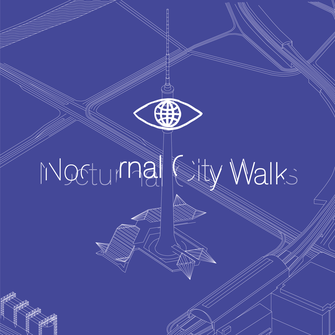
Making Future (Night) School @ Haus der Statistik Berlin, September 2019, together with Gözde Şarlak-Krämer
The Situationist notion of dérive enables one to float playfully in the urban context and also leads to new perceptions of urban social life, territories, and temporalities. In the wake of a great transformation of the former headquarters of the State Central Administration for Statistics of the GDR, we invite you to a series of collective drifts at night as a means of uncovering the dark side of the city. With a series of dérives in the broader neighbourhood of Haus der Statistik, we wish to explore the occluded, hidden, uncanny spaces, engage with multi-sensorial urban atmospheres, and discover the urban life after dark. We see this collective movement as a research setting through which to pay attention to the terrain vague, investigate human and more-than-human agents, and engage with the narratives of the past and provoke new urban imageries in the glow of electric lights in the urban darkness.
Our drifts will begin with a short round of introduction for sensitizing ourselves to the notions of collective walking and the drifts will be accompanied by a series of readings and sound recordings.Hamburger Journal Für Kulturanthropologie (Universität Hamburg – Institut für Kulturanthropologie) Nr. 9 (2019): Urbane Designanthropologie, pp. 51-57; Editor: Sebastian Topp
Essay, July 2019
The paper discusses the development of maps and their function within society. It links the genesis of early maps with the current development of urban apps and the success of Pokémon Go. Thus it questions the practice of mapping and gives an overview over the critical perspectives of digital mapping, with a focus on Google Maps.
»Googles dividuelle Karten als Grundlage einer digitalen Kontrollgesellschaft«
ARCH+ 234: Projekt Bauhaus 3: Datatopia, p. 126-133
Essay, March 2019
DATATOPIA: Wir erleben momentan die Entstehung von Gesellschaftsformationen, Denkweisen und Lebensarten, die ohne den Computer nicht fassbar wären. Datenbasierte Prozesse, in denen alles – von Orten, Objekten, Formen, Oberflächen, Materialien und Körpern – kodiert, transkodiert und rekodiert wird, münden in einer Datengesellschaft, die nicht mehr auf tradiertem Wissen basiert, sondern in der das Sammeln, die Interpretation und Nutzbarmachung von Daten die Grundlage des Gesellschaftlichen bilden. Wie wird sich unsere Lebenswelt verändern, wenn unser materielles und kognitives Handeln immer mehr von Automatisierung und künstlicher Intelligenz übernommen wird?
Die klassische Avantgarde glaubte an Fortschritt, eine bessere Zukunft und an Verbesserung durch Innovation. Mittlerweile hat das Neue seine Unschuld verloren.
Während die immer schneller werdenden kapitalistischen Prozesse oft als problematisch empfunden werden, negieren viele (vor allem konservative) Kritiker diese Problematisierung oder lehnen sie ab. Ist der Fortschritt noch emanzipatorisch und sind Schutz und Erhaltung reaktionär? Oder liegen die Dinge grundsätzlich ganz anders? Die Forderung des Akzelerationismus, die Allianz zwischen emanzipatorischen Zielen und technischen und wissenschaftlichen Fortschritten zu erneuern, hat zu der Debatte geführt, ob diese Verbindung ihr Versprechen einhalten kann oder die Emanzipation auf die Mittel der Kritik und der Abweichung zurückgreifen muss. Außerdem schaffen Technologie und Finanzkapitalismus neue geopolitische Ordnungen, verschieben ideologische Narrative und verändern gesellschaftliche Systeme. Doch wissenschaftliche und technische Fortschritte führen in der Gesellschaft nur zu eingeschränkten sozialen Verbesserungen. Daher muss die Frage gestellt werden: Entstehen die gegenwärtigen, rückwärtsgewandten politischen und ideologischen Trends trotz oder wegen der Fortschritte in der Informationstechnologie? Welche zeitgemäßen Modelle einer kulturellen Praxis gibt es, die Technologie und Wissensproduktion unter Aspekten des gesellschaftlichen Fortschritts als globales Ganzes betrachten? Wie kann solch eine Praxis gestaltet und kommuniziert werden? Wie kann sie in der Öffentlichkeit verbreitet werden?
[https://www.archplus.net/]
Final Report, Teaching, Februar 2019
Habitat Unit, TU Berlin
The focus of this research have been on bottom-up approaches and techniques (e.g. decentralized platforms, networks, digital maps), which respond to and facilitate the growing interest of citizens/users in taking a more active part in shaping their cities themselves. How can digital tools enable local communities and support userdriven urban transformation processes and co-production of neighborhoods? How can planers foster the reappropriation of digital space outside the dominant corporate sphere? What is the relationship between digital and physical commons? Are there digital counterstrategies for empowerment, especially for the growing informal settlements in the Global South?
Therefore the keytopics of the research have been: open access, open data, digital co-production, empowerment for informal communities through digital tools.The found case studies have a broad thematical spectrum: From mobility, to crisis management, to community mapping, to civic participation, to payment and microfinance systems, to actors based urban management, to questions of open digital infrastructures; on very different scales. Aim of the research is to critically reflect the case studies and their individual context.
The seminar consisted of, parallel to reading sessions, individual desktop research, combined by a constant collaborative group discussion and reflection process. Final output of the research are 1-3 posters for each project.
2018
»Moravia Manifiesto – Coding Strategies for Informal Neighborhoods«
Publication – October 2018
Edited by Moritz Ahlert / Maximilian Becker / Albert Kreisel / Philipp Misselwitz / Nina Pawlicki /
Tobias Schrammek
Jovis Publishers Berlin, English/Spanish, Softcover, 17 x 24 cm, 344 pages
ISBN 978-3-86859-535-2
The Moravia Manifesto presents the alternative planning approaches put forward by an international Think&Do tank, which were developed together with local participants from the Moravia informal settlement at the heart of the Colombian metropolis Medellín. This new planning approach is contextualized by essays and international case studies. Urban Coding shows new ways of how planning, politics, economy and administration can initiate and implement innovative and inclusive urban transformation processes in coproduction with local communities.
With contributions by: Moritz Ahlert, Maximilian Becker, Christian Burkhard, Daniel Carvalho, Sónia Dias, Alejandro Echeverri, Lucia Fernandez, David Gouverneur, Kim Annaluz Gundlach,
Rupali Gupte, Juliana Gutiérrez, Daniel Heuermann, Cielo María Holguín Ramirez, Florian Koehl, Albert Kreisel, Taibat Lawanson, Daniela Maturana, Philipp Misselwitz, Timothy Nubi,
Basirat Oyalowo, Nina Pawlicki, Jochen Rabe, Juan Manuel Restrepo, Alejandro Restrepo Montoya, Tobias Schrammek, Prasad Shetty
Illustrations: Dubian Monsalve
Graphic Design by: David Voss Leipzig (Ondine Pannet, Lisa Pflästerer)
Urban Lab Medellín I Berlin is a project run by Urban Oasis (Maximilian Becker, Albert Kreisel, Tobias Schrammek), in collaboration with the Habitat Unit at TU Berlin (Professor Philipp Misselwitz, Nina Pawlicki, Moritz Ahlert) and representatives of the quarter Moravia, supported by Alfred Herrhausen Gesellschaft and Arch+ Verein zur Förderung des Architektur- und Stadtdiskurses.
»Die Große Transformation @ Floating University Berlin«
April - July 2018
As part of Habitat Unit - TU Berlin I am participating in the Floating University Berlin Project.
From May to September 2018 raumlaborberlin will create a visionary inner city offshore-laboratory for collective, experimental learning, knowledge transfer and the formation of transdisciplinary networks to challenge routines and habits of urban practices.
The Habitat Unit is organizing and conceptualizing a summer school, which is scheduled from 16.07. - 29.07.2018. Participants of this summer school, called »Die Große Transformation«, are local actors of the surrounding neighborhoods.
Together with Prof. Dr. Philipp Misselwitz and Dr. phil. Anna Marie Steigemann.
Image © raumlaborberlin

»Psychographic Mapping of Mobility«
March 2018 – Artist residency in Barcelona, in cooperation of Jiwar and Goethe Barcelona.
The project during the residency consisted of three parts: a lecture on »the New Power of Digital Maps« at Goethe Institut Barcelona, an interactive mapping platform ✋Hands-on-up-off-BCN.org/ together with Alsino Skowronnek and three »Deriva Collectiva« – situationistic walks in different neighborhoods in Barcelona.
2017
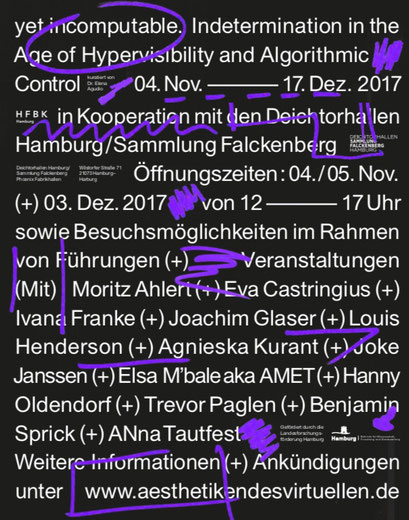
»Yet incomputable. Indetermination Principles in the Age of Hypervisibility and Algorithmic
Control.«
04/11/2017 – 17/12/2017 – Exhibition contribution
Deichtorhallen Hamburg - Falckenberg Collection, at Phoenix-Hallen Harburg
Curated by Dr. Elena Agudio, Co-Director SAVVY Contemporary, Berlin.
Together with Eva Castringius, Ivana Franke, Joachim Glaser, Louis Henderson, Agnieska Kurant, Joke Janssen, Elsa M'bala, Hanny Oldendorf, Trevor Paglen, Benjamin Sprick, ANna Tautfest.
Images by Michael Pfisterer, 2017.
–––––––––––––––––––––––––––––––––––––––––––––––––––––––––––––––––––––––––––––––
Editor: Elena Agudio / Editorial coordination: Peter Müller
Design: Hanna Osen and Paul Voggenreiter
Artists: Moritz Ahlert, Eva Castringius, Ivana Franke, Joachim Glaser, Louis Henderson, Agnieska Kurant, Joke Janssen, Elsa M'bala, Hanny Oldendorf, Trevor Paglen, Benjamin Sprick, ANna Tautfest.
Essayists: Elena Agudio, Zach Blas, Antonia Majaca und Luciana Parisi, Matteo Pasquinelli.
Materialverlag der HFBK Hamburg 12/2017 – Material 390, ISBN: 978-3-944954-40-0
Format: 17,5 x 25 cm, Hardback with laminated cover, relief varnish, 4C offset print, paperback, stitched binding, 204 pages with
coloured illustrations
»Subjective Atlas of Transformation«
Urban fabrics change rapidly and people have different opinions and emotions about how these transformations affect their neighborhoods.
Together with Alsino Skowronnek, we installed an »Subjective Atlas of Transformation« for Leipzig. It seeks to capture perceived developments in the city in a crowd-sourced
database. It allows anyone to input information about specific places that have undergone a transformation process that is deemed important. Subjective interpretation of this process is reflected
in the visualization of these places through emojis 😀 and a 3D landscape of transformation density.
The project was shown as an interactive map installation at the STATTFINDEN Festival
at Glasfabrik Leipzig in September 2017 and still lives on the internet here emojimap.de.
Groupexhibition together with [Emilia Lichtenwagner, Patricia Gerger, Janine Muckermann and Rahel Saba Mariam Albrich], [Ina Luft, Joachim F. Burkhardt and Lisa Steindl], [Jasper Meiners, Isabel Paehr, Lennert Raesch and Jörn Röder], [Angelika Waniek, Daniel Theiler and Bertolt Meyer], [Ali Schwartz, Juliane Zöllner, Aleksander Oglaza and Lena Schrieb], [Thomas Weber and Svenja Hinzmann].

»Wir sind in der Stadt, wir können sie nicht verlassen« /
»Estamos en la ciudad, no podemos salir de ella«
2016-2017
»Wir sind in der Stadt, wir können sie nicht verlassen« vereinigt unterschiedliche künstlerische Formate, anhand derer das Thema Mobilität kritisch reflektiert werden soll. Die sieben beteiligten Künstler und Künstlerinnen verstehen Mobilität dabei nicht allein als physische Bewegung im städtischen Raum, sondern gehen auch Fragen sozialer, ökonomischer und ökologischer Mobilität nach. Sieben Interventionen im städtischen Raum reflektieren sieben Themenachsen, entlang derer Mobilität in ihrer Komplexität gefasst wird.
»Wir sind in der Stadt, wir können sie nicht verlassen« ist ein Forschungs-, Interventions- und Ausstellungsprojekt, das anlässlich des Deutschlandjahres vom Goethe-Institut Mexiko in Kooperation mit mehreren Ausstellungshäusern der Universidad Nacional Autónoma de México (UNAM) veranstaltet wird. Titelgebend für das Projekt sind Ausschnitte aus Octavio Paz´ Gedicht „Hablo de la ciudad“ („Ich rede von der Stadt“) von 1987, in dem er eine fiktive Stadt beschreibt. Im Zentrum dieses weit gefächerten Projekts steht das Thema Mobilität, die nicht allein als physische Bewegung in der Stadt gedacht wird, sondern auch Fragen sozialer, ökonomischer und ökologischer Mobilität umfasst.
––––––––––––––––––––––––––––––––––––––––––––––––––––––––––––––––––––––––––––––––
»Mexibility – ESTAMOS EN LA CIUDAD, NO PODEMOS SALIR DE ELLA«
Exhibition – 23.03.-02.07.2017
Casa del Lago Juan José Arreola - Mexico-City
Curated by Moritz Ahlert, Friedrich von Borries and Victor Palacios.
Mappings by Moritz Ahlert
Graphic design by Moritz Ahlert and Larissa Starke
In cooperation with Goethe-Institut Mexiko.
With works of: Marcela Armas, Christoph Faulhaber, Jesko Fezer & Öffentliche Gestaltungsberatung, Arturo Hernández Alcázar, Folke Köbberling, Armin Linke, Miguel Monroy, Marjetica Potrč & Design for the Living World, Sebastian Quack, Michael Sailstorfer, Karin Sander, Isabelle Schad and Tobias Zielony.
Foto © Agustin Estrada / Araceli Limón
––––––––––––––––––––––––––––––––––––––––––––––––––––––––––––––––––––––––––––––––
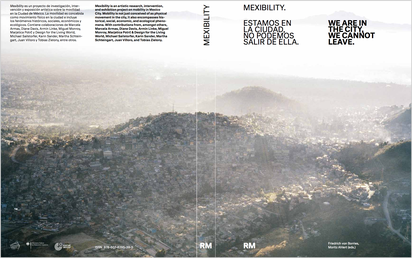
»MEXIBILITY. WE ARE IN THE CITY, WE CANNOT LEAVE«
Publication – June 2017
editorial RM - 372 pages
Moritz Ahlert and Friedrich von Borries (eds.), Mappings by Moritz Ahlert, Graphic design by Moritz Ahlert and Larissa Starke, in cooperation with Goethe-Institut Mexiko.
ISBN RM México: 978-607-8295-39-5 / ISBN RM Verlag: 978-84-17047-07-8
With contributions by Moritz Ahlert, Airen, Marcela Armas, Armen Avanessian, Friedrich von Borries, Fernando Brito, Alejandro Cartagena, Livia Corona, Diane E. Davis, Rodrigo Durán, Christoph Faulhaber, Jesko Fezer & Öffentliche Gestaltungsberatung, David FitzGerald, Arturo Hernández Alcázar, Joshua Jobb, Folke Köbberling, Viola König, Peter Krieger, Armin Linke, Ernesto Lopez, Pablo Lopez Luz, Onnis Luque, Miguel Monroy, Felipe Orensanz, Marjetica Potrč & Design for the Living World, Octavio Paz, Mark Powell, Alicia Puyana, Sebastian Quack, Pj Roundtree, Michael Sailstorfer, Karin Sander, Isabelle Schad, Martha Schteingart, Juan Villoro and Tobias Zielony.
Coverimage by Pablo Lopez Luz.
–––––––––––––––––––––––––––––––––––––––––––––––––––––––––––––––––––––––––––––––
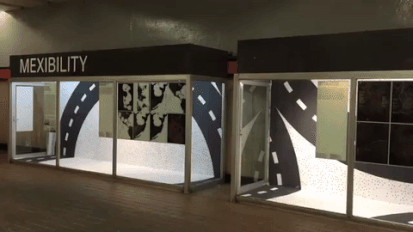
»Mapability – Mexibility« / Mini-Map-Metro-Exhibition
in cooperation with Goethe Institut Mexico and Sistema de Transporte Colectivo Metro
Mexico-City – Metro-Polanco – June 2017
–––––––––––––––––––––––––––––––––––––––––––––––––––––––––––––––––––––––––––––––
Groupexhibition 03.02.-19.02.2017
Wiensowski & Harbord – Lützowstraße 32 – 10785 Berlin
Moritz Ahlert, Katja Aufleger, Bureau d‘Études, M Eifler,
Jenny Odell, Hanny
Oldendorf, Alsino Skowronnek & Hans Hack
Fotos © Matthias Kolb
Giving a collaborative mapping workshop
Co - producing Housing Solutions
02-2017
In context of the spring school in Medellin organized by Urban Oasis in cooperation with Habitat Unit Berlin Prof. Philipp Misselwitz, ARCH+ Verein zur Förderung des Architektur- und Stadtdiskurses, amongst others; with 30 students of TU Berlin, students from Medellin and locals from Moravia/Medellin, together with Nina Pawlicki.
2016
Partizipation und urbane Intervention – Dimensionen, Gespräche, Projekte
Publication – Contribution with Jens-Uwe Fischer
Annette Menting, Walter Prigge, Ronald Scherzer-Heidenberger, Andreas Thiesen (ed.)
ISBN: 9783940691811
»Dimensionen nationaler und internationaler Ansätze der Partizipation und urbanen Interventionen von Madrid und Istanbul bis
Hamburg und Berlin werden in diesem Band von Stadtplanern, Soziologen, Architekten und Landschaftsgestaltern diskutiert. Modelle des gesellschaftlichen Verhandelns von Raum und der Praxis seiner
Aneignung sind Gegenstand der Gespräche zu Partizipation im Stadtraum Leipzig mit verschiedenen Akteuren wie einer Politikerin, Bürgerin, Künstlerin und Aktivistin. Der Katalogteil präsentiert
themenbezogene Projekte von Studierenden, Absolventen und Lehrenden der Fakultät Architektur und Sozialwissenschaft, HTWK Leipzig, wie Ereignisdesign, Quartiersmanagement, Greiz Interventionen,
Kleider machen Räume, 100 % Health, Kinderstraßen, Architekturmaschine, Feinkost u.v.a.«
2015

Critical Mapping 2.0 – Ten Years of Google Maps
Lecture
Harvard University - Graduate School of Design
2014
Urbane Interventionen Istanbul
– Learning from Gezi?
Co-edited with Friedrich von Borries and Jens-Uwe Fischer
208 Pages
Merve Verlag Berlin, 2014
ISBN 978-3-88396-367-9
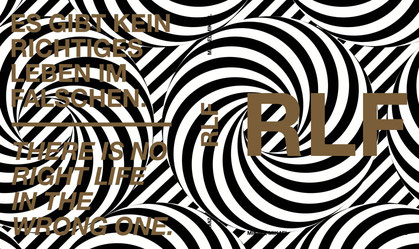
RLF – Mikael Mikael
Editorial Design
192 pages
Distanz Verlag Berlin, 2014
ISBN 978-3-95476-089-3
––––––––––––––––––––––––––––––––––––––––––––––––––––––––––––––––––––––––––––––––
2013

Die Berliner
Weltverbesserungsmaschine (Exhibition)
Exhibition architecture and -design
Hamburger Bahnhof – Museum für Gegenwart – Berlin, and other museums (Ägyptisches Museum und Papyrussammlung, Alte
Nationalgalerie, Antikensammlung, Ethnologisches Museum, Deutsches Historisches Museum, Gemäldegalerie, Hamburger Bahnhof – Museum für Gegenwart, Museum Berggruen, Museum Europäischer Kulturen,
Museum für Asiatische Kunst, Museum für Naturkunde Berlin, Museum für Vor- und Frühgeschichte, Neue Nationalgalerie, Sammlung Scharf-Gerstenberg, Skulpturensammlung and Museum für Byzantinische
Kunst und Vorderasiatisches Museum), 2013
––––––––––––––––––––––––––––––––––––––––––––––––––––––––––––––––––––––––––––––––
Foto © Projektbüro Friedrich von Borries / Clemens Finkelstein

Die Berliner Weltverbesserungsmaschine – Die Rekonstruktion einer abstrakten Imagination
Co-Editorship with Friedrich von Borries
and Jens-Uwe Fischer
+ Editorial Design
232 pages
Merve Verlag Berlin, 2013
ISBN 978-3-88396-344-0
––––––––––––––––––––––––––––––––––––––––––––––––––––––––––––––––––––––––––––––

Die Berliner Weltverbesserungsmaschine – Eine Geschichte des fortwährenden Scheiterns
Editorial Design
196 pages
Merve Verlag Berlin, 2013
ISBN 978-3-88396-343-3
––––––––––––––––––––––––––––––––––––––––––––––––––––––––––––––––––––––––––––––


Editorial Design
Monopol-Insert Edition 50,000,
64 pages
Accompanying the exhibition in Villa Schöningen, Potsdam, 2013

Inside Out – Catalog and documentation of the exhibition and workshops
Co-Editorship with Anne Binder and Christoph T. Herrmann
+ Editorial Design
64 pages
Verlag der Universität der Künste Berlin,
2013
2012

Jugendfonds als Instrument der Stadtentwicklung
Cover Design + Comic (inside the booklet)
Bundesministerium für Verkehr, Bau und Stadtentwicklung
2011


Berliner Atlas paradoxaler Mobilität
Editorial Design and Co-authorship
220 pages
Merve Verlag Berlin, 2013
ISBN 978-3-88396-304-4
––––––––––––––––––––––––––––––––––––––––––––––––––––––––––––––––––––––––––––––



2009

Europan 10 – OBSTMETROPOLE LEISNIG
»Shortlist« – 2009
Together with Stephan Bosse und Thomas
Cremers

»Urban Agriculture as a Strategy for Shrinking Cities in Eastern Germany. Case study Weissenfels, Saxony-Anhalt«
UdK Berlin – Architecture – Diploma Thesis
Together with Robert Chr. Friebe
Completed with “Note 1.0” (very good). Supervisors: Prof. A. Krischanitz , Prof. S. Hauser and Prof. A. Ranner.





